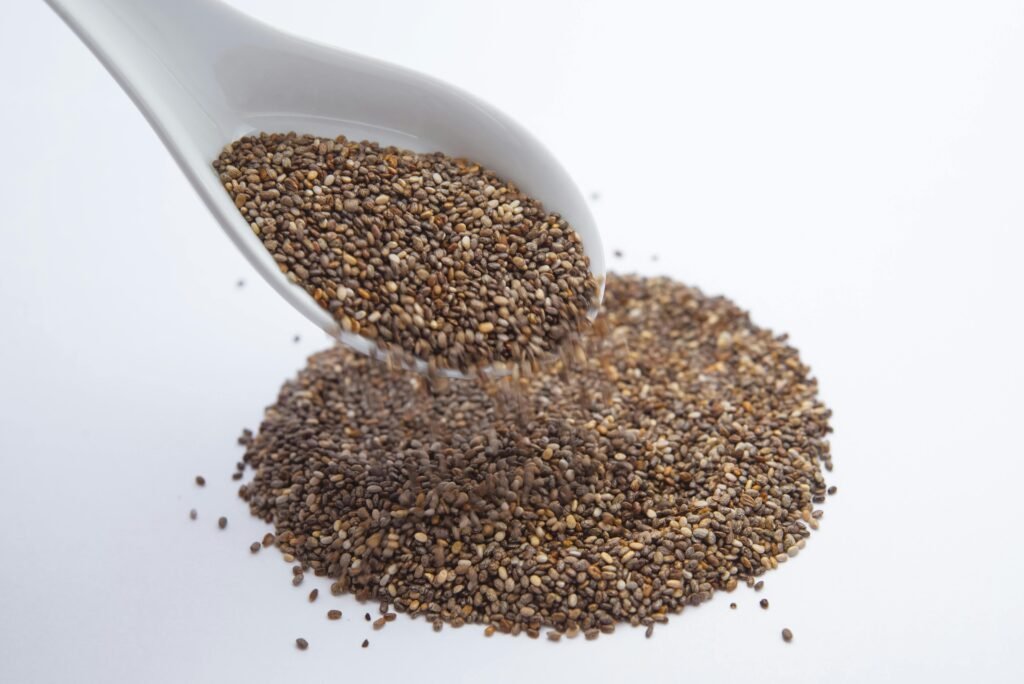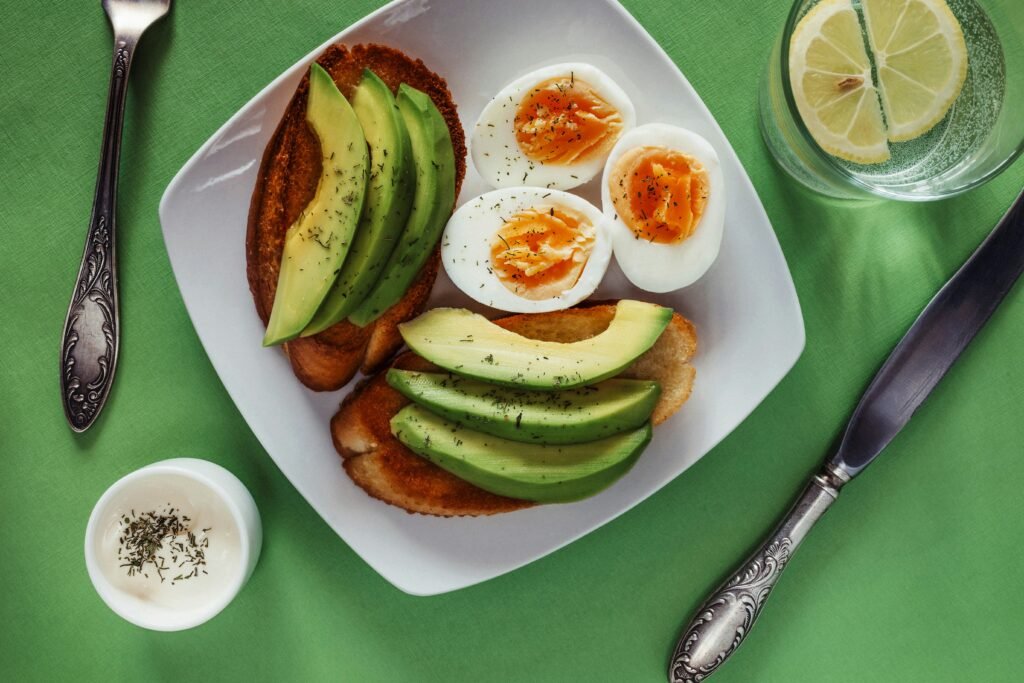Chia seeds, those tiny black and white specks that you might have seen sprinkled over smoothie bowls or blended into a refreshing glass of chia pudding, are much more than just a trendy superfood. They pack a powerful nutritional punch and have a wide range of health benefits. In this blog post, we’ll explore the fascinating world of chia seeds, delving into their history, nutritional profile, health benefits, and how you can easily incorporate them into your daily diet. So, grab a seat and let’s dive into the wonderful world of chia seeds!

- Origins of Chia Seeds
- Nutritional Profile Of Chia Seeds
- Health Benefit Of Chia Seeds
- How to Incorporate Chia Seeds Into Diet
- Tips For Buying And Storing Chia Seeds
👉The Humble Origins of Chia Seeds
From Ancient Aztec Staple to Modern Superfood
Chia seeds, now a ubiquitous ingredient in health-conscious kitchens worldwide, have a rich history deeply rooted in the heart of Central America. These tiny, nutrient-packed seeds were once a cornerstone of the ancient Aztec diet, revered for their ability to sustain energy and endurance.
A Gift from the Aztecs
Originating from the desert plant Salvia hispanica, chia seeds thrived in the arid conditions of Mexico and Guatemala. The Aztecs recognized their remarkable properties and incorporated them into their daily meals. Warriors and messengers relied on chia for sustenance during long journeys, as it provided a concentrated source of energy and hydration.
Beyond their nutritional value, chia seeds held cultural and religious significance for the Aztecs. They were believed to possess medicinal properties and were used in various rituals and ceremonies. Unfortunately, with the Spanish conquest, chia cultivation was suppressed, and its importance gradually faded into obscurity.
👉The Nutritional Profile of Chia Seeds
Despite their small size, chia seeds are a nutritional powerhouse. Here’s a breakdown of what you can find in just one ounce (28 grams) of chia seeds:
- Fiber: Chia seeds are incredibly high in fiber, with nearly 11 grams per ounce. This is about one-third of the recommended daily intake for adults. Fiber is essential for digestive health and helps keep you feeling full longer.
- Protein: They contain around 4 grams of protein per ounce. This makes them a great plant-based protein source for vegetarians and vegans.
- Omega-3 Fatty Acids: Chia seeds are one of the best plant-based sources of omega-3 fatty acids, specifically alpha-linolenic acid (ALA). Omega-3s are essential for heart and brain health.
- Calcium: With 18% of the recommended daily intake per ounce, chia seeds are great for bone health.
- Manganese: Essential for bone health and metabolism, chia seeds provide about 30% of the recommended daily intake.
- Magnesium: Crucial for many bodily functions, including muscle and nerve function, chia seeds offer about 30% of the recommended daily intake.
- Phosphorus: Important for bone health and energy production, chia seeds contain around 27% of the recommended daily intake.
👉Health Benefits of Chia Seeds
Now that we know how nutrient-dense chia seeds are, let’s explore the numerous health benefits they offer:
1. Supports Digestive Health
Chia seeds have become a popular addition to many diets due to their numerous health benefits, and digestive health is no exception. Packed with fiber and other essential nutrients, these tiny seeds can work wonders for your gut.
How Chia Seeds Benefit Your Digestion
- Fiber Powerhouse: Chia seeds are an excellent source of both soluble and insoluble fiber. Soluble fiber absorbs water, creating a gel-like substance that aids in digestion and promotes regularity. Insoluble fiber adds bulk to stool, preventing constipation.
- Gut Bacteria Boost: The fiber in chia seeds acts as a prebiotic, feeding the beneficial bacteria in your gut. A healthy gut microbiome is essential for optimal digestion and overall well-being.
- Gentle on the Digestive System: Chia seeds are generally well-tolerated and don’t cause the digestive discomfort often associated with some high-fiber foods. However, it’s essential to start with small amounts and gradually increase intake to allow your body to adjust.
2. Aids in Weight Management
Chia seeds have gained immense popularity in recent years, often touted as a weight loss wonder. But do these tiny seeds truly hold the key to shedding those extra pounds? Let’s dive into the science behind chia seeds and weight management.
While the research is still developing, chia seeds possess several properties that could potentially contribute to weight management:
- High in Fiber: Chia seeds are packed with fiber, both soluble and insoluble. Fiber helps promote satiety, keeping you feeling fuller for longer and reducing overall calorie intake.
- Hydration Boost: These seeds absorb water, creating a gel-like substance in your stomach. This can help slow down digestion, leading to increased feelings of fullness and potentially reduced appetite.
- Nutrient-Dense: Rich in protein and healthy fats, chia seeds provide essential nutrients without adding excessive calories. This can help support overall health and well-being during weight loss.
3. Boosts Heart Health
Chia seeds have rapidly gained popularity as a superfood, and for good reason. These tiny, nutrient-packed seeds offer a multitude of health benefits, including significant advantages for heart health.
- Rich in Fiber: Chia seeds are an excellent source of fiber, particularly soluble fiber. This type of fiber helps lower LDL (bad) cholesterol, a key risk factor for heart disease. By reducing LDL cholesterol levels, chia seeds contribute to a healthier heart.
- Omega-3 Fatty Acids: These seeds are packed with alpha-linolenic acid (ALA), a type of omega-3 fatty acid. While research is ongoing, omega-3s are believed to help reduce triglycerides, lower blood pressure, and decrease the risk of irregular heartbeats.
- Antioxidants: Chia seeds contain antioxidants that help protect cells from damage caused by harmful free radicals. This oxidative stress is linked to heart disease, so by consuming antioxidants, you may reduce your risk.
- Blood Pressure Regulation: Some studies suggest that chia seeds can help lower blood pressure, a major risk factor for heart disease. The combination of fiber, omega-3s, and other nutrients in chia seeds may contribute to this beneficial effect.
4. Enhances Bone Health
Chia seeds, often hailed as a nutritional powerhouse, have been gaining popularity for their potential benefits on various aspects of health. Among these benefits, their role in supporting bone health is particularly noteworthy.
Bone-Building Nutrients in Chia Seeds
Chia seeds are packed with essential minerals vital for bone health:
- Calcium: Essential for building and maintaining strong bones.
- Phosphorus: Works in tandem with calcium to strengthen bone tissue.
- Magnesium: Plays a crucial role in bone formation and density.
These minerals, combined with other nutrients found in chia seeds, contribute to overall bone health.
How Chia Seeds Support Bone Health
While more human studies are needed, the potential benefits of chia seeds for bone health are promising:
- Mineral Absorption: The fiber in chia seeds can aid in the absorption of calcium and other minerals, enhancing their utilization for bone health.
- Anti-inflammatory Properties: Some studies suggest that the omega-3 fatty acids in chia seeds may have anti-inflammatory effects, which could potentially benefit bone health.
- Bone Mineral Density: Animal studies have shown that chia seed consumption can increase bone mineral density. However, human research is still limited.
5. Stabilizes Blood Sugar Levels
Chia seeds have gained significant attention for their potential to support blood sugar management. These tiny, nutrient-packed seeds offer several properties that contribute to their blood sugar-regulating benefits.
How Chia Seeds Help Control Blood Sugar
- Fiber Powerhouse: Chia seeds are exceptionally rich in fiber, both soluble and insoluble. Fiber slows down digestion, preventing rapid spikes in blood sugar levels. It also promotes satiety, helping to regulate appetite and prevent overeating.
- Improved Insulin Sensitivity: Some studies suggest that chia seeds may enhance insulin sensitivity. Insulin is a hormone responsible for transporting glucose from the bloodstream into cells for energy. Improved insulin sensitivity means better glucose utilization and reduced blood sugar levels.
- Low Glycemic Index (GI): The glycemic index measures how quickly a food raises blood sugar levels. Chia seeds have a low GI, indicating a gradual release of glucose into the bloodstream, preventing sudden spikes.
6. Provides Energy and Endurance
Chia seeds have long been recognized for their ability to provide sustained energy and enhance endurance. These tiny powerhouses were a staple in the diets of ancient civilizations like the Aztecs, who relied on them for fuel during long journeys and strenuous activities. Let’s explore how chia seeds can benefit your energy levels and athletic performance.
The Energy Boost from Chia Seeds
- Sustained Energy Release: Chia seeds are rich in fiber, which slows down digestion and prevents rapid blood sugar spikes. This leads to a steady release of energy, keeping you feeling fueled for longer periods.
- Protein Powerhouse: Chia seeds are a good source of plant-based protein, essential for muscle repair and growth. Protein also helps regulate blood sugar levels and provides a sustained energy source.
- Healthy Fats: These seeds contain omega-3 fatty acids, which are important for heart health and can contribute to energy production.
Enhancing Endurance with Chia Seeds
- Hydration Hero: Chia seeds have a remarkable ability to absorb water, forming a gel-like substance in the stomach. This helps maintain hydration levels during prolonged physical activity, preventing dehydration and fatigue.
- Electrolyte Balance: Chia seeds contain essential minerals like magnesium and potassium, which play a crucial role in electrolyte balance. Proper electrolyte levels are vital for muscle function and preventing cramps.
- Antioxidant Protection: The antioxidants in chia seeds help combat oxidative stress, reducing muscle damage and inflammation that can occur during intense exercise.
7. Rich in Antioxidants
Chia seeds are packed with antioxidants, which help protect your body from damage caused by free radicals. Antioxidants play a crucial role in preventing chronic diseases and promoting overall health.
👉How to Incorporate Chia Seeds into Your Diet
Chia seeds are tiny but packed with nutrients, making them a fantastic addition to a healthy diet. Here are some creative ways to incorporate them into your daily routine:
Breakfast Boost
- Chia Pudding: Create a creamy and satisfying breakfast by soaking chia seeds in milk or plant-based milk overnight. Add flavor with honey, maple syrup, or fruit.
- Smoothie Thickener: Toss a spoonful of chia seeds into your morning smoothie for added texture and nutrition.
- Oatmeal Topping: Sprinkle chia seeds on top of your oatmeal for a crunchy and fiber-rich finish.
Lunchtime Upgrade
- Salad Crunch: Add a handful of chia seeds to your salad for a satisfying crunch and extra nutrients.
- Sandwich Spread: Mix chia seeds with avocado or hummus for a unique and healthy sandwich spread.
Afternoon Snack
- Chia Water: Hydrate and nourish your body with chia water. Simply soak chia seeds in water for a refreshing and filling drink.
- Chia Energy Balls: Create homemade energy balls using chia seeds, nuts, seeds, and dried fruit for a convenient and healthy snack.
Dinner Delight
- Soups and Stews: Thicken your soups and stews with chia seeds for a creamy texture and added nutrition.
- Baked Goods: Incorporate chia seeds into your baking recipes for a fiber and protein boost.
Tips for Incorporating Chia Seeds
- Start Slowly: Begin with small amounts of chia seeds and gradually increase your intake to allow your body to adjust.
- Hydration: Drink plenty of water when consuming chia seeds, as they absorb liquid and can cause bloating if not properly hydrated.
- Experiment: Don’t be afraid to experiment with different flavors and textures when using chia seeds.
By incorporating chia seeds into your diet, you can enjoy their numerous health benefits while adding variety and flavor to your meals.
👉Tips for Buying and Storing Chia Seeds
- Organic and Non-GMO: When possible, opt for organic and non-GMO chia seeds to ensure you are getting the highest quality product.
- Store in a Cool, Dry Place: Keep your chia seeds in an airtight container in a cool, dry place to prevent them from going rancid.
- Refrigerate for Longer Shelf Life: For even longer shelf life, you can store chia seeds in the refrigerator.
Chia Seeds and Sustainability
In addition to their health benefits, chia seeds are also a sustainable crop. They require minimal water and can grow in diverse climates, making them an environmentally friendly food choice. By incorporating chia seeds into your diet, you are not only benefiting your health but also supporting sustainable agriculture practices.
👉Common Questions About Chia Seeds
Question 1: Can Chia Seeds Cause Constipation?
Chia seeds are generally known for their ability to promote digestive health, but can they actually cause constipation?
The answer is: it depends.
The Fiber Factor
Chia seeds are rich in fiber, both soluble and insoluble. While fiber is generally beneficial for digestion, including promoting regularity, excessive intake can sometimes lead to constipation.
- Insoluble fiber adds bulk to stool and helps prevent constipation.
- Soluble fiber absorbs water, forming a gel-like substance that can help soften stool.
When Chia Seeds Might Cause Constipation
- Excessive intake: Consuming too many chia seeds without adequate hydration can lead to constipation.
- Individual sensitivity: Some people may be more sensitive to the fiber content in chia seeds and experience digestive discomfort.
- Insufficient water intake: Proper hydration is crucial for fiber to work effectively. Dehydration can worsen constipation.
Question 2: Can Chia Seeds Cause Bloating?
Chia seeds are often praised for their nutritional benefits, but like any food, they can cause digestive discomfort for some people, including bloating.
Why Chia Seeds Might Cause Bloating
- High Fiber Content: Chia seeds are packed with fiber, which is generally beneficial for digestion. However, consuming too much fiber too quickly can lead to bloating, gas, and discomfort.
- Water Absorption: Chia seeds absorb water, expanding in the digestive system. While this is generally helpful, excessive consumption can cause bloating in some individuals.
Preventing Bloating from Chia Seeds
To minimize the risk of bloating:
- Start Slowly: Introduce chia seeds into your diet gradually to allow your body to adjust.
- Stay Hydrated: Drinking plenty of water is essential for proper digestion and to help the fiber in chia seeds work effectively.
- Mind Your Portions: Begin with small amounts of chia seeds and gradually increase your intake as tolerated.
- Combine with Other Fiber Sources: Incorporate chia seeds into a diet rich in various fiber sources to avoid overwhelming your digestive system.
- Listen to Your Body: Pay attention to how your body reacts to chia seeds. If you experience bloating or other digestive discomfort, reduce your intake or temporarily avoid them.
Question 3: Which Chia Seeds Are Best?
The short answer: most chia seeds are pretty similar.
There are two main types of chia seeds: black and white. While they have slightly different appearances, their nutritional profiles are nearly identical. Both are packed with fiber, omega-3 fatty acids, and other essential nutrients.
What to Look For When Buying Chia Seeds
When selecting chia seeds, focus on these qualities:
- Organic: Opt for organic chia seeds to avoid potential exposure to pesticides.
- Whole: Look for whole chia seeds rather than ground or milled ones to preserve their nutritional value.
- Freshness: Check the expiration date and try to purchase chia seeds that are relatively fresh.
Busting the Myths
There are many claims about different types or brands of chia seeds being superior. However, without concrete scientific evidence, it’s difficult to substantiate these claims.
Focus on quality, freshness, and organic certification rather than being swayed by marketing claims.
Conclusion
Chia seeds may be small, but their impact on health is mighty. From improving digestive health to boosting heart health, supporting weight management, and providing sustained energy, chia seeds offer a plethora of benefits. Their versatility makes them easy to incorporate into various dishes, ensuring that you can enjoy their nutritional benefits in many delicious ways.
So, why not start today? Add a sprinkle of chia seeds to your healthy meals and experience the incredible health benefits these tiny seeds have to offer. Your body will thank you!




Wonderful web site Lots of useful info here Im sending it to a few friends ans additionally sharing in delicious And obviously thanks to your effort
Fantastic beat I would like to apprentice while you amend your web site how could i subscribe for a blog site The account helped me a acceptable deal I had been a little bit acquainted of this your broadcast offered bright clear concept